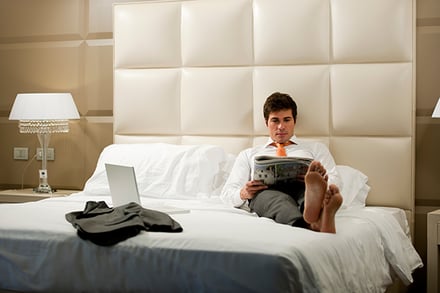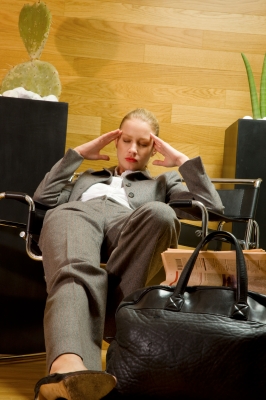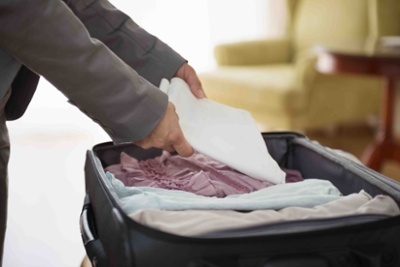The majority of professionals consider business trips to be a motivational factor. However, trips are often an uncertain terrain that can cause headaches and stress. It is a fine line. Therefore, it is important to know how to unwind once in a while, take a moment to have a breather and carry on with your work more effectively afterwards. Here are 5 tips for minimizing stress as a Corporate Traveller.
When we analyse the costs related to business trips, we often concentrate on factors such as staff costs, compliance with expense policies, fraud, process efficiency and so on. However, it is much less common to focus on the effects of stress. This remains an intangible factor that is hard to quantify.
 Nevertheless, stress reduces productivity, increases absenteeism and is, in short, a factor that reduces wellbeing. According to research by the United Nations, stress causes a drop of between 1% and 3.5% of the Gross Domestic Product in industrialized countries.
Nevertheless, stress reduces productivity, increases absenteeism and is, in short, a factor that reduces wellbeing. According to research by the United Nations, stress causes a drop of between 1% and 3.5% of the Gross Domestic Product in industrialized countries.
In the case of Corporate Travellers, stress is a hidden factor that generates costs. A report by Carlson Wagonlit Travel strives to study this phenomenon in detail and measure its consequences for the company.
Wasting time, unforeseen circumstances and breaking habits are the main sets of factors that generate stress.
They group the main triggers of stress for corporate travellers into three large categories. First of all, there are the situations in which it is difficult or impossible to work when we need to. The tasks that cannot wait and which the employee wants to get done despite working on other duties. One example would be not being able to take advantage of a train journey or flight to work because there is no internet connection or because your laptop battery has run out.
Another group of stress triggers are unexpected circumstances. These situations take us off the planned course and, as such, require travellers to change their plans. These include lost luggage, flight cancellations, changes to appointments, etc.
The third group relates to the professional’s ability to keep up their everyday habits. This factor is inherently difficult when it comes to travelling. It is hard to manage to maintain the routine that the employee is used to doing in their normal life, such as doing exercise, being on a diet, upholding certain schedules, etc.
Measuring the impact of stress on the costs related to corporate travel in the specific case of our company is no easy task, and it is even harder to relate it to other sources of costs, such as time off work and decreased productivity. However, companies should embrace the concept that tightening the screws on its expense policy (as the research shows) can have damaging effects that may outweigh the savings expected at first glance.
5 anti-stress tips
Every corporate traveller has to deal with stress in their own way, as everybody reacts differently. However, we are going to give five tips that are useful to anyone travelling for professional purposes, helping them to relax during their journeys and, as a result, manage the stress caused by the third group of triggers mentioned above more effectively.
1. Choose your clothing well 
In order to feel good, the first requirement is to wear suitable clothing. This does not only mean suitable in the sense of being appropriate for the occasion (not too formal or casual), but also in terms of comfort. Trousers that are too tight, a jacket that doesn’t keep you warm enough, a shirt that is too thick, heels that are too high, etc. We don’t only have to think of our appearance but also what we have to do while dressed this way If we are comfortable in the clothes we are wearing, we will also work better.
2. Balanced diet
It may sound like a cliché, but it true nonetheless: we need to watch what we eat. During a business trip, particularly if it lasts a few days, it is easy to eat too much or too little, with either extreme making us feel uncomfortable. It is also important to make sure that you don’t drink too much coffee, especially in the evening. We should also avoid snacking between meals and eat plenty of fruit and vegetables.
3. Get moving
During train or aeroplane journeys, it is important to move around. Get up, stretch your legs, do some neck and shoulder exercises to relax. This applies to all journeys longer than a couple of hours, or even shorter if you are feeling tense. For car journeys, the tip is equally valid and perhaps even more so: pull over every two hours to take a breather and stretch your legs.
It is also highly advisable to take some exercise during the journey, if it is long-haul. For instance, if your hotel is well equipped and you have the chance, get to the gym or go for a swim. Fifteen minutes should be enough to start feeling better. If you don’t have access to these facilities, or no time to go, take the time to walk to your various meetings or appointments. You will be far more relaxed when you get there. This obviously requires you to have enough time to cover the distance without having to run.
 4. Change your surroundings
4. Change your surroundings
From the hotel to work and from work back to the hotel. You are on a business trip to work, not to waste time on distractions. Big mistake! Your mind needs to switch off a little in order to work at optimal performance, as well as taking time to do something that you enjoy: read for a while (book, magazine, comic, whatever!), watch a film in the hotel or go to the cinema, see a show (a play, concert, specialist workshop, etc.), do some sightseeing. Take some time out and don’t feel guilty about it. When you get back to work, you will be much fresher and more efficient.
5. Disconnect
For you to be able to switch off, you first have to switch off your phone and laptop. You can’t unwind if you constantly have one eye on your messages, calls, emails and everything else. Nothing will happen if you unplug for a couple of hours in the evening, for example. It is also important to turn all of your devices off half an hour before you go to sleep so that you don’t get into bed with your mind still on the job.




